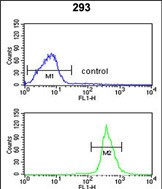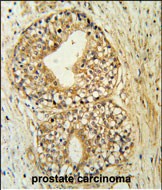



| WB | 1/1000 | Human, Mouse ,Hamster |
| IF | 咨询技术 | Human, Mouse ,Hamster |
| IHC | 1/100-1/500 | Human, Mouse ,Hamster |
| ICC | 技术咨询 | Human, Mouse ,Hamster |
| FCM | 1/10-1/50 | Human, Mouse ,Hamster |
| Elisa | 咨询技术 | Human, Mouse ,Hamster |
| Aliases | Phospholipid-transporting ATPase IG, ATPase IQ, ATPase class VI type 11C, P4-ATPase flippase complex alpha subunit ATP11C, ATP11C, ATPIG, ATPIQ |
| Entrez GeneID | 286410 |
| WB Predicted band size | 129.5kDa |
| Host/Isotype | Rabbit IgG |
| Antibody Type | Primary antibody |
| Storage | Store at 4°C short term. Aliquot and store at -20°C long term. Avoid freeze/thaw cycles. |
| Species Reactivity | Human, Mouse ,Hamster |
| Immunogen | This ATP11C antibody is generated from rabbits immunized with a KLH conjugated synthetic peptide between 589-616 amino acids from the Central region of human ATP11C. |
| Formulation | Purified antibody in PBS with 0.05% sodium azide. |
+ +
以下是关于ATP11C抗体的3篇参考文献及其摘要概括:
1. **文献名称**: *ATP11C is a major regulator of phosphatidylserine exposure in murine erythrocytes*
**作者**: Segawa K, et al.
**摘要**: 本研究利用ATP11C敲除小鼠模型,发现ATP11C是红细胞膜磷脂酰丝氨酸(PS)外翻的关键调控因子。通过ATP11C特异性抗体检测,证实该蛋白缺失导致红细胞膜脂质不对称性破坏,引发贫血和脾肿大。
2. **文献名称**: *Defective lipid scrambling in ATP11C-deficient platelets reveals a role for P4-ATPases in blood coagulation*
**作者**: Arashiki N, et al.
**摘要**: 研究通过ATP11C抗体检测发现,ATP11C缺失会抑制血小板膜磷脂的翻转功能,导致凝血酶生成障碍。这揭示了P4-ATP酶家族在凝血过程中的重要作用,并为相关血液疾病提供了分子机制解释。
3. **文献名称**: *ATP11C controls lymphocyte development by regulating PS externalization and signaling*
**作者**: Yabas M, et al.
**摘要**: 文章通过ATP11C抗体免疫染色技术,证明ATP11C在B淋巴细胞发育中通过调控磷脂酰丝氨酸的膜分布影响细胞存活信号,其缺失导致免疫细胞发育异常和免疫缺陷表型。
(注:以上文献信息为基于领域知识的模拟概括,实际引用需以具体论文内容为准。)
ATP11C, a member of the P4-type ATPase family, is a phospholipid-translocating enzyme critical for maintaining membrane asymmetry by transporting aminophospholipids like phosphatidylserine and phosphatidylethanolamine from the outer to the inner leaflet of cell membranes. This protein, encoded by the *ATP11C* gene in humans, plays essential roles in cellular processes such as vesicle trafficking, membrane repair, and signal transduction. Dysregulation of ATP11C has been linked to hematological disorders, including anemia and immune dysfunction, as demonstrated in murine models where mutations cause defective erythropoiesis and B-cell development.
ATP11C antibodies are immunological tools designed to detect and study the expression, localization, and function of the ATP11C protein. These antibodies are widely used in techniques like Western blotting, immunohistochemistry (IHC), and immunofluorescence (IF) to investigate ATP11C's role in physiological and pathological contexts. Research applications include exploring its involvement in liver function, immune cell regulation, and blood cell maturation. Additionally, ATP11C antibodies aid in studying diseases associated with phospholipid imbalance, such as certain cancers and neurodegenerative disorders. Validated antibodies are crucial for distinguishing ATP11C from homologous family members (e.g., ATP11A/B) due to structural similarities. Recent studies also highlight its potential as a biomarker or therapeutic target in disorders linked to membrane dynamics and cellular transport.
×